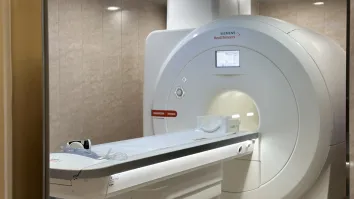
EY Parthenon's Partha Basumatary joins Healthcare Asia's elite panel of judges
The COVID-19 pandemic, according to Partha, has humbled healthcare by challenging our assumption that we can easily defeat a disease.
Partha is EY's Director in the Strategy & Transactions team in Singapore. With more than ten years of industry and consulting experience under his belt, he specialises in the life sciences and healthcare industries and has served clients in the pharmaceuticals, emerging biopharma, consumer health, and med-tech sectors.
Partha studied Computer Science before doing his MBA in IIM Lucknow. And while pharmaceuticals or life sciences was not his chosen career option, he ended up working at Pfizer India by chance and loved the experience and purpose behind his work.
After spending some time in the industry, he moved to consulting with a Big 4 in India before moving to the SEA region. With Singapore as his base, Partha is currently a Director in the Life Sciences consulting team of EY Parthenon in Singapore.
Partha advises clients on a wide range of topics including commercial and corporate strategy, digital transformation, funding and market access, and many more. Most of his work is for pharmaceutical, medical device and biotech companies across APAC and other emerging markets globally.
Moreover, he has worked across the APAC region and has led large engagements including business transformation, corporate strategy, go-to-market strategy, commercial excellence, brand strategy, asset valuation, and due diligence for regional and local clients.
As one of the judges for Healthcare Asia Awards 2021, Partha sat down with us as he shared his insights about patient-centricity, digital transformation, healthcare investments during and after the pandemic, and healthcare industry trends
When judging the winners, what specific traits or achievements will make a healthcare company stand out from the rest?
A standout healthcare company displays patient-centricity. That indelible focus on patient care and the drive to improve treatment outcomes, enabling the HCPs and other stakeholders, makes an organisation differentiate itself from the competition.
I came across various examples of companies doing that while going through the entries. An example is an international collaboration between Taiwan and the Philippines to improve the prognosis of rare disease patients shows that it is possible to break barriers and deliver the right outcomes for patients in need.
What are some of your observations about this year's nominated entries?
I was very impressed by the quality of the nominated entries. I could see a lot of examples of how different players have tried to address the challenges faced by them due to COVID-19. There are a few very good case studies of how the healthcare companies tried to take care of their employees' mental health and exhaustion-related challenges during the pandemic.
I was particularly impressed by one of the entries from a technical institute where students are creating a solution to collaborate with traffic agencies in crowded cities to help ambulances pick up patients and reach their destinations faster.
As a judge, it was a tough call, but I learned a lot through the experience.
Which trends do you think will define the healthcare industry in the years to come?
I fundamentally see the COVID-19 pandemic as a game-changer for the healthcare industry. It has exposed gaps in healthcare systems globally in terms of capacity, reach, and efficiency. In a (forced) response, investments in healthcare transformation programmes have surged, specifically around the following themes. While it has overwhelmed the entire healthcare ecosystem, it will also expedite transformation across the board. Specifically:
Digital: I expect treatment (may not be in its entirety but at least partially) to shift from a hospital setting to home / remote care. Providers will have to adopt technology (e.g. wearables, apps) to monitor the vital parameters of patients for effective outcomes. And while this is not a new concept (e.g. players such as Biofourmis are doing that in the US), we will see a greater adoption going forward. It is, in a way, augmenting telemedicine to provide end-to-end care to patients.
Infrastructure: With the havoc that the COVID-19 has created in the world, I expect greater investment in hospital infrastructure and preventative healthcare. For the former, there will be a focus on the creation of the right guidelines, pathways, and crisis management preparedness (from an HC perspective) going forward. It could open up private investments in healthcare with the government making it a priority industry across various countries. On the latter, there will be a growing focus on wellness and prevention, including investments in vaccines and infectious diseases.
Care shift: Trends such as preventive healthcare, wellness, faster diagnosis, remote care, patient management support enabled by technology, etc. will also be relevant going forward
How can digital technology advance the healthcare industry? And what are the most important challenges of these companies when starting their digital transformation journey?
Technology can fundamentally transform healthcare in terms of improved patient outcomes, engaging customer experiences, and increased convenience and efficiencies. To reach the full potential of technology, however, healthcare stakeholders need to define first a clear vision and aspirational objectives for the transformation to be truly 'purpose led'. Many players look at digital in a very incremental manner - change current manual processes to digital. That is great but that limits the potential. The biggest value of digital transformation comes when healthcare providers think about using digital technology to disrupt the entire ecosystem.
A simple example would be: Can a pharma company use digital technology to bring HCPs and patients on one common platform? Can artificial intelligence (AI) or machine learning (ML) be used to help HCPs manage their patients better? How can we use technology to generate real-world evidence that can impact patient outcomes?
These could potentially sound like "alien concepts" but pharma companies are moving in that direction. Of course, they will have to comply with pharmacovigilance and other compliance / regulatory restrictions, but technology will enable them to do various things that otherwise would not have been feasible.
There are various examples in the provider space as well - such as using AI / ML algorithms to scan through CT / MRI scans to accurately diagnose a disease and / or monitor progression, thereby saving manual efforts and expediting care.
There are a couple of major challenges faced by players trying to do digital transformation: inertia to change and lack of data. Various organisations find it difficult to inculcate that 'mindset shift'. An agile operating model across the organisation is required to reap the benefits of digital transformation. Additionally, a strong data backbone is critical to achieving digital goals. Companies either do not have the right data or have suboptimal information that compromises execution, implementation, and monitoring of digital initiatives
Where should healthcare companies invest during and after the pandemic?
It is a great question. I would pick four things:
1. Digital transformation: Invest in building digital capabilities to transform the business model for the future. It should, however, be backed by the right data infrastructure. It is important to capture, process, and analyse the right data for decision-making. For example, it is important to know a doctor's preferences before blasting him/her with a barrage of information. You need data to profile him and understand his preferences to make your customer engagement more effective.
2. People and culture: Invest in the right talent or in upskilling your current talent pool to prepare for the evolving needs in the market. You cannot expect to go back to the "old normal" and do the same things again.
3. Partnerships: No one player will be able to do everything. Healthcare companies will need to be efficient and partner with ecosystem players to provide benefits to the key stakeholders (e.g. patients, HCPs) across the treatment continuum.
4. Resilience: This pandemic has taught everyone a lot of lessons. The key is to build resilience into the operating model - be it supply chain decentralisation, working capital discipline, business continuity preparedness for future global crises that might lurk around the corner.
What are some of the trends that will affect how corporate strategists create and implement new healthcare projects soon?
I would say that companies will have to take a measured approach to their long-term strategies and prepare for different scenarios (including plan B). They will have to factor in contingencies when they think about future strategic plans.
If we talk about M&A, there will be assets that will be up for sale, but companies will have to evaluate the right fit and long-term strategic value before making the investments.
Changing customer expectations with a focus on convenience and cost will drive the business models of the future. I expect treatment to move from the traditional model of selling medicines to delivering value to patients through a solution-minded approach.
The entry of non-traditional healthcare players (e.g. Amazon's entry into healthcare with Pillpack) will radically change the landscape and open new opportunities & give rise to new challenges for the incumbents in the ecosystem.
Governments across the region are likely to focus on infrastructure creation and might engage in PPP projects more often which could open up greater opportunities for investments in healthcare across the value chain.
How has the pandemic affected the way you view healthcare?
Healthcare has become even more important. We, as a society, now understand the need to invest in the right healthcare infrastructure to prepare for the next healthcare emergency.
Interestingly, this pandemic has also shown that competitors can work together. Various pharma companies collaborated very closely (e.g. sharing data and production facilities) to develop treatment options for the fight against COVID-19.
It has also shown that a clinical trial that typically takes several years could be expedited when there is an urgent need. Remote trials are increasingly being adopted and some of these changes are likely to have a lasting impact.
It also, in a way, humbled us by challenging our assumption that we can easily defeat a disease. While I am sure we will be able to overcome the pandemic (hopefully soon), it has shown that we need to be better prepared for the future in terms of infrastructure, people, processes, technology, etc.

















 Advertise
Advertise






